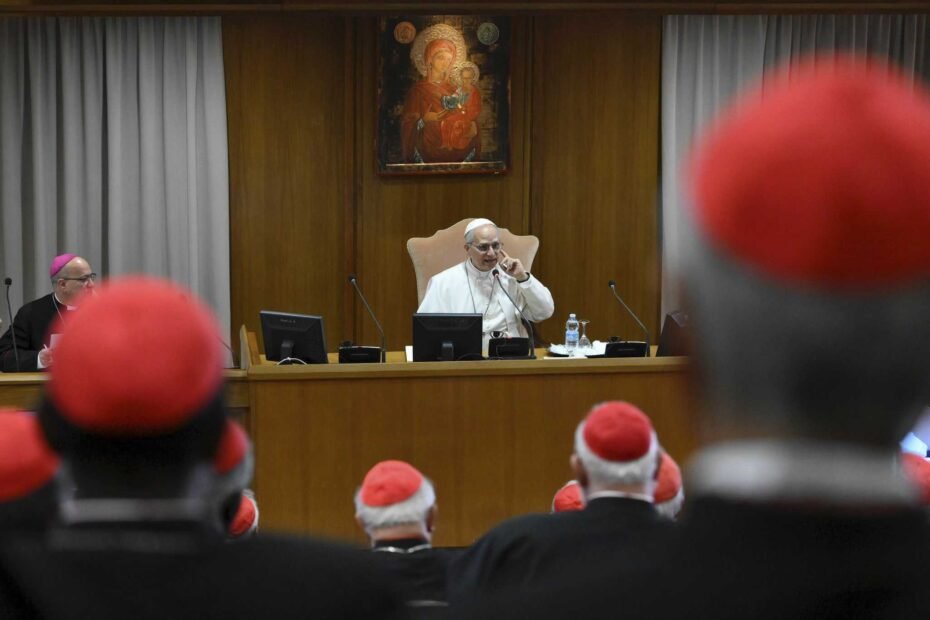On Saturday, Pope Leo XIV outlined his papal agenda, emphasizing artificial intelligence as a crucial issue for mankind. He also pledged to uphold several key objectives set forth during Pope Francis’s tenure.
The video above discusses how Pope Leo XIV was selected as the first U.S.-based pontiff, causing jubilation globally.
During his initial official gathering, Leo frequently referenced both Francis and the Argentine Pope’s mission statement from 2013, emphasizing a dedication to fostering a more welcoming and responsive Catholic Church that prioritizes support for the “marginalized and disregarded.”
Leo, the inaugural U.S. pontiff, addressed the cardinals who had chosen him, assuring them of his full dedication to the changes instituted during the Second Vatican Council—the conferences held in the 1960s aimed at updating the Church. He pinpointed artificial intelligence as a significant concern for mankind, noting that it presents difficulties in safeguarding human worth, fairness, and employment.
The Vatican indicated another aspect of his focus by announcing that Leo, who belongs to the Augustinian religious order, will keep the same motto and coat of arms used during his time as Bishop of Chiclayo, Peru. This motto, “In Illo Uno Unum,” was articulated by Saint Augustine in a homily to convey that despite our being numerous Christians, within the one Christ, we become united as one.
Identifying with Pope Francis
Leo cited AI when discussing why he chose his name; his namesake, Pope Leo XIII, served as pope from 1878 to 1903 and established the groundwork for contemporary Catholic social teachings. This foundational work was notably accomplished through his issuance of the 1891 encyclical “Rerum Novarum,” which tackled issues related to workers’ rights and capitalism during the onset of the industrial era. In this document, the former pontiff condemned both unregulated capitalist practices and government-dominated socialism, thereby shaping a distinctively Catholic approach to economics.
During his comments on Saturday, Leo mentioned that he related to his predecessor, who tackled the significant social issue raised by the Industrial Revolution in the encyclical.
“Today, the Church presents its repository of social teachings as an answer to yet another industrial revolution and advancements in artificial intelligence that present fresh challenges for protecting human dignity, justice, and employment,” he stated.
Towards the conclusion of his papacy, Francis grew more outspoken regarding the dangers AI poses to humankind and advocated for an international agreement to oversee its development and use.
He cautioned that this potent technology could transform interpersonal relationships into nothing more than equations. When addressing the Group of Seven leaders at their summit last year, Francis conveyed his message, emphasizing that artificial intelligence should be centered around humanity. He stressed that choices regarding the deployment of weaponry or even non-lethal devices must consistently be made by people rather than automated systems.
The late Argentine pontiff similarly utilized his 2024 yearly peace address to advocate for an international agreement aimed at ensuring AI is created and employed with ethical considerations. He contended that a technology devoid of human virtues such as compassion, empathy, moral integrity, and forgiveness poses too significant a risk to be allowed unrestricted development.
In numerous respects, Francis viewed the Chicago-native Augustinian missionary Robert Prevost as akin to a successor: In 2014, he transferred him to lead a modest-sized diocese in Peru, where Prevost eventually assumed the role of bishop and chairperson for the Peruvian bishops’ assembly. Later, in 2023, Francis summoned Prevost to Rome with the responsibility of overseeing one of the key Vatican departments responsible for evaluating candidates for episcopal positions worldwide.
During the address presented in Italian within the Vatican’s synod hall—not the Apostolic Palace—Leo frequently mentioned Pope Francis and expressed deep sorrow regarding his passing. He showcased Francis’ inaugural message from 2013 titled “The Joy of the Gospel” as guiding principles for himself, indicating an intention to uphold many of Francis’ key focuses moving forward.
He pointed out Francis’ emphasis on the church’s missionary character and the importance of making its governance more collaborative. He also highlighted the necessity of listening to the laity, particularly their genuine and encompassing expressions like devotional practices. Referring once again to Pope Francis’ 2013 exhortation, Leo underscored the call for the Church to show “compassionate concern” towards those who are marginalized and neglected, as well as to courageously converse with today’s society.
A quick conclave
As he walked in, Leo was met with a standing ovation and proceeded to read from his pre-prepared remarks, glancing up infrequently. Similarly, even during his initial appearance to the public at the loggia of St. Peter’s Basilica on Thursday evening, Leo delivered lines from a carefully handwritten script which he likely composed either prior to his significant election or within an hour following it. However, he appeared more at ease when spontaneously uttering brief comments in Spanish.
Prevost was chosen as the 267th pope on Thursday after just four ballots during the papal conclave, which was remarkably quick considering this was both the biggest and widest-ranging gathering ever. Many of the cardinals did not know each other prior to coming to Rome for this event.
Cardinals mentioned that Prevost didn’t deliver significant speeches during the preliminary talks before the conclave, and they entered the conclave adhering to the customary prohibition against selecting an American Pope due to the country’s global prominence. However, Prevost was familiar to many cardinals because of his extensive service as both a missionary and a bishop in Peru over several years, coupled with his role leading the Vatican’s office for bishops since 2023.
It was mentioned that he left a mark in more intimate settings where English served as the primary means of dialogue during a gathering that united 133 cardinals hailing from 70 different nations.
Madagascar Cardinal Désiré Tsarahazana informed journalists on Saturday that on the last vote count, Prevost obtained more than 100 votes. This indicates an unprecedented majority, significantly above the required two-thirds, which stands at 89 votes, needed for election.
